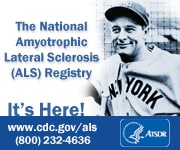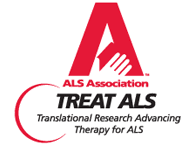
This morning there was a letter to the editor in my local paper from a national board member of the Alzheimer's Association. The letter was emphasizing the need for added federal funding for research (sound familiar?). The seal-the-deal line was that for every dollar the federal government spends on Alzheimer's research, it spends $2.50 on patient care.
I turned the page with two thoughts --
- The federal research::care ratio makes a compelling case for increasing research spending, and I'm sure that ALS has a ratio that is even more lopsided than Alzheimer's.
- Organizations need leaders who are ready, able, and willing to write letters to editors and keep their causes in front of the public. Board and executive staffs are full of talented and eloquent people. Please speak up!










3 comments:
Here is a letter from a person with ALS that was written last summer and published in many Chicago area papers, including the Sun-Times. Letters to the Editor can be an effective way to help raise awareness and get the message to a broad audience.
Dear Editor,
How much is a human life worth? According to the United States government, mine is not valued very highly.
In 2003, I began experiencing symptoms later diagnosed as amyotrophic lateral sclerosis (ALS), widely known as Lou Gehrig’s disease. ALS is a progressive neuromuscular disorder that weakens and destroys motor neurons, causing paralysis and death. There is no cure or effective treatment. In the 150 years we have known about ALS, science has unveiled few answers as to its cause or progression.
Approximately 35,000 people in the U.S. live with ALS at any given time, including an alarming number of recent veterans. As ALS is relatively rare, I was disappointed but not surprised to find pharmaceutical companies uninterested in funding research, but was shocked how government supports ALS research compared to other conditions.
I found the National Institutes of Health (NIH) spends billions of dollars for research -- the vast majority targeting preventable, treatable, and non-life threatening diseases. The sample below provides perspective of how much money the NIH is willing to spend to prevent each death in the following diseases (2008):
HIV/AIDS: $198,263
Substance abuse: $162,353
Sexually transmitted diseases:$40,833
ALS: $7,167
I shared my statistical analysis with Representative Bill Foster. He was impressed by the manner in which these statistics highlight inequities in NIH grant allocations and believes hard statistics help legislators make good decisions about how and where to direct federal funding.
Don't misunderstand me. The targets of NIH research dollars are deserving. However, I believe government's main role in health research should focus on basic research and on areas deemed unprofitable by private industry.
July 4 marks the 70th anniversary of Lou Gehrig's famous “Luckiest Man” speech and many ALS awareness activities are planned to commemorate this occasion. Please help raise awareness of ALS by sharing this information with their elected federal officials and the Secretary of Health and Human Services.
Thank you,
Steven Heronemus
Mr. Heronemus' comments are very telling. However, it isn't enough to just ask for "awareness". Patients are tired of simply having hope. The NIH only spends $42M annually on ALS research, most of which is not directed towards the creation of treatments or therapies. the ALSA is spending only 17% of its dollar on research, and an even smaller amount on therapeutic approaches. It is not simply the awareness of the lack of spending, it is how does the ALS community influence the direction of spending to the best therapeutic approaches out there. I see that the TREAT ALS logo is on this site, but dig deep and you will find that ALSA doesn't provide a whole lot of support to that ideal. This is window dressing. Give dollars to programs which are trying to bring therapies to clinics rapidly.
I suppose this state of affairs should not be viewed flippantly, but I can't resist. If it was announced that some of this post-doctoral basic research has determined that ALS in the military was linked to erectile dysfunction, there would a major shift in research emphasis.
Next time I get reincarnated I hope I get a more popular disease. ALS has turned out to be real bummer, and an orphan bummer at that.
Post a Comment